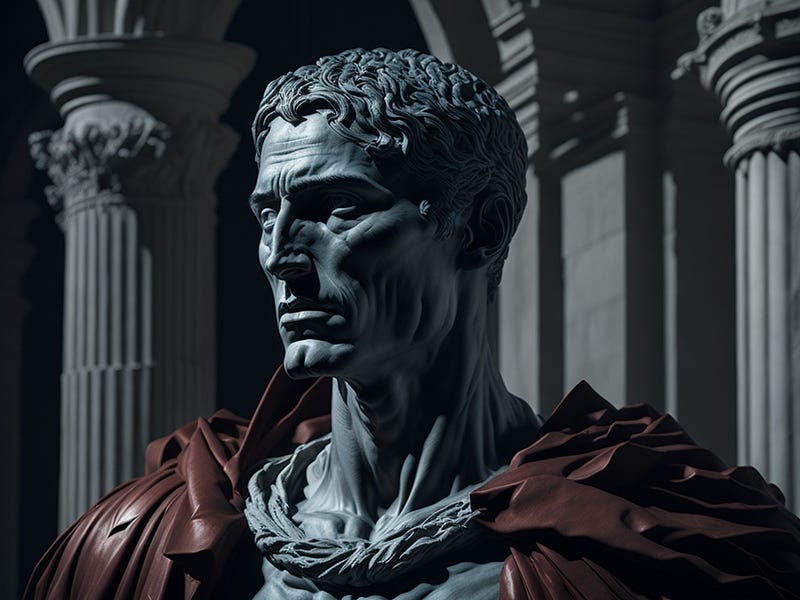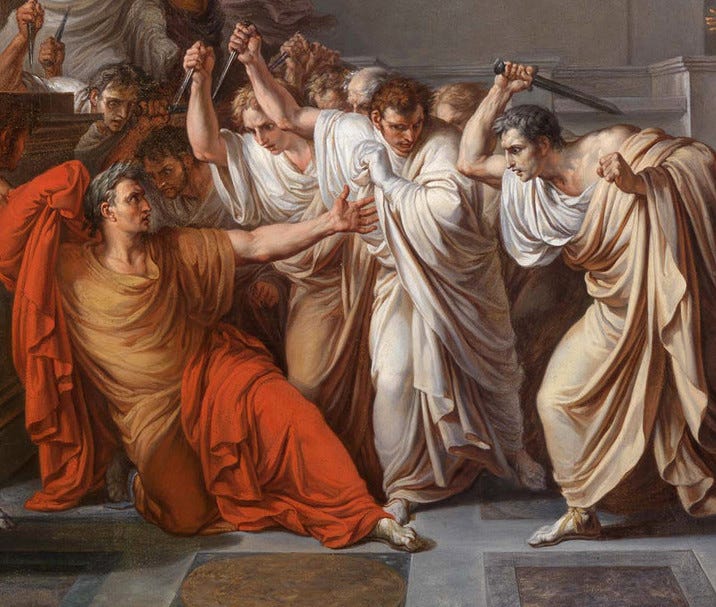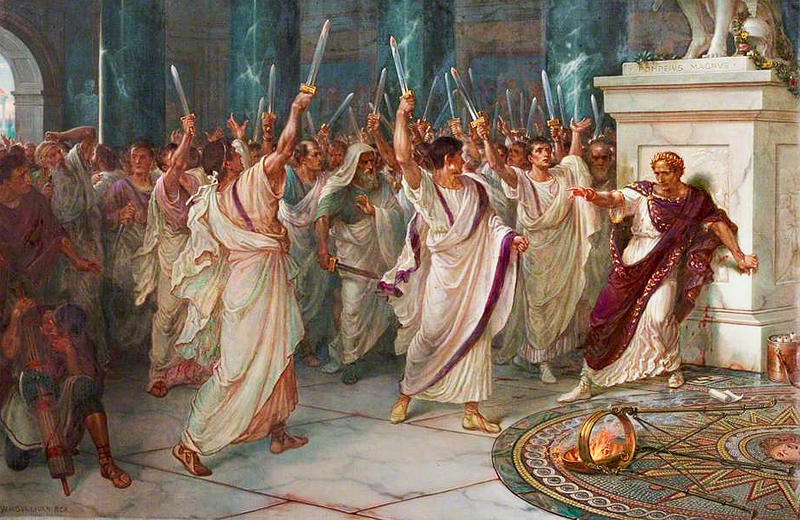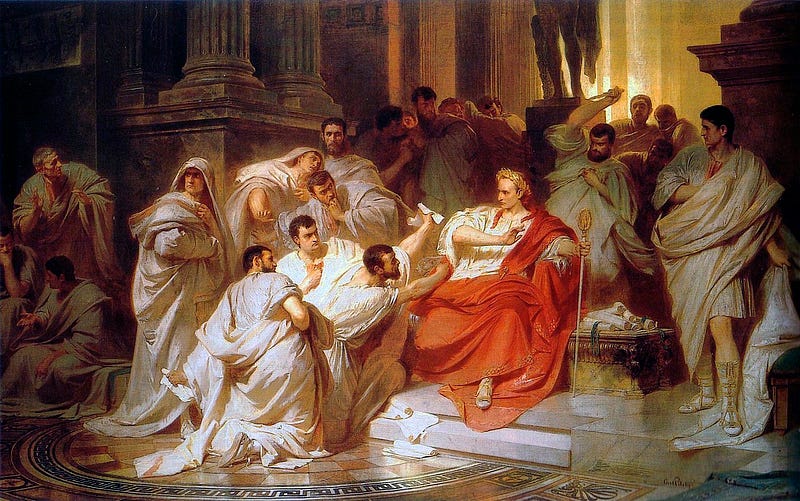Exploring the Assassination of Julius Caesar: Myths and Realities
Written on
Chapter 1: The Legacy of Julius Caesar
Julius Caesar stands out as a pivotal figure in Roman history, serving as a military leader, politician, and dictator. His assassination on March 15, 44 BCE, has long been attributed primarily to Marcus Junius Brutus. Yet, recent investigations suggest that another Brutus may have played a significant role in this historical event.

Dante Alighieri famously placed both Cassius and Brutus in the depths of hell, with their punishment rivaled only by that of Judas. Centuries later, William Shakespeare portrayed Brutus as a tragic hero, a man who prioritized liberty over personal loyalty. This dramatization has inspired countless revolutionaries since the late 18th century, embedding the narrative deeply into popular culture. Challenging this established depiction is as audacious as the assassination itself. Historian Barry Strauss, in his work "The Death of Caesar," aims to shed light on the overlooked details surrounding Caesar's demise.
Section 1.1: The Assassination Unfolds
As the conspirators readied their daggers, hidden under their tunics, they had gladiators poised nearby to intervene if necessary. With Caesar's late arrival at the Senate portico, anxiety rippled through the group. Rumors of an impending assassination had swept through Rome. The dictator was scheduled to depart for the East shortly, with whispers of plans for him to assume a royal title—an idea that was anathema to Roman sensibilities.
The conspirators knew they had to act before Caesar could surround himself with loyal troops, making their plan more difficult to execute. When the moment arrived, they surrounded Caesar, blending in with the crowd of petitioners. Quintus Tillius Cimber's act of pulling Caesar's toga was the signal for the assault. The conspirators then unleashed their daggers upon him.
Unable to flee or defend himself, Caesar attempted to shield his face with his toga. After enduring multiple strikes, he collapsed lifelessly before the statue of his rival Pompey.

Section 1.2: How Many Assassins Were Involved?
Upon examining the body, physician Antistius reported twenty-three stab wounds, with only one being particularly fatal. Plutarch's account claims each conspirator was required to stab Caesar, but this is likely an exaggeration. Notably, Gaius Trebonius was tasked with detaining Mark Antony outside the Senate.
Plutarch's views reflect the ancient belief that conspiracies among citizens were inherently suspicious. In this instance, however, the assassination was intended to be executed openly. The conspirators sought to share the infamy of Caesar's murder, each motivated by personal agendas rather than a unified political vision.
The conspirators’ motives were diverse, with some driven by personal grievances against Caesar, while others sought to restore the republic. Interestingly, they appeared indifferent to who delivered the first blow. Some accounts credit Publius Servilius Casca, though he was not a principal figure. The precise number of conspirators remains speculative, as ancient sources do not provide a comprehensive list.

Chapter 2: Motivations Behind the Conspiracy
The first video, "Killing God: The Assassination of Julius Caesar," delves into the circumstances surrounding this historic event, providing insights into the motivations of the conspirators.
The assertions of historian Nikolaos of Damascus suggest that envy fueled the conspirators' actions. In the months leading to the assassination, Caesar's growing honors and behaviors stirred discontent. Suetonius noted that he accepted accolades that seemed almost divine, including a golden chair in the Senate and statues of himself alongside the gods.
Opposition to Caesar's autocratic tendencies contributed to the conspirators' resolve, particularly among those who had faced humiliation during his rise. Many had family members who lost property or were exiled due to Caesar's victories. Interestingly, a majority of conspirators were once Caesar's allies.
Among those who conspired against him were those seeking revenge for personal slights, such as Minucius Basilus, who felt cheated out of a governorship. Family ties also played a role, as divisions often arose during the civil war. For example, Cimber's brother was in exile, prompting his involvement in the conspiracy.
As Barry Strauss highlights, Caesar's personality alienated many in his circle, contributing to the conspiratorial atmosphere. The conspirators aimed to frame the assassination as a liberating act against tyranny rather than personal vengeance.
The second video, "Almanac: Assassination of Julius Caesar," further explores the motivations and implications of this pivotal event.
Chapter 3: The Aftermath of Caesar's Death
Marcus Junius Brutus is often remembered as a central figure in Caesar's assassination, stemming from his lineage linked to the early republic. The pressures he faced to act against Caesar were immense. Historical accounts indicate that public sentiment rallied around Brutus as the embodiment of republican values.
Initially, Brutus had sided with Pompey during the civil war. After Pompey's defeat, he switched allegiance to Caesar, gaining favor as governor of Cisalpine Gaul. His marriage to Porcia, the daughter of Cato the Younger, further complicated his relationship with Caesar, especially given her family’s opposition to the dictator.
Gaius Cassius Longinus, another key conspirator, was known for his early opposition to Caesar's rising power. Their eventual collaboration in the conspiracy was likely influenced by their shared experiences and familial ties. Both men, having reached their forties, recognized the restrictions Caesar's rule placed on their ambitions.
The conspirators met in secret to strategize, indicating that the conspiracy had likely formed weeks before the assassination to maintain secrecy. While Brutus and Cassius are often highlighted, Decimus Junius Brutus Albinus also played a crucial role, particularly in deceiving Caesar on the day of the assassination.
Following Caesar's death, Mark Antony, who was also a consul, assumed control. Initially, he opted for a conciliatory approach, allowing Caesar's decrees to remain in place. However, public sentiment quickly turned against the assassins, leading to their eventual downfall.
In the wake of the chaos, Decimus attempted to flee but was captured and met a grim fate. Reports suggest he faced his execution with despair, prompting his friend to take his own life in solidarity.
As the conspirators faced increasing hostility, their legacy transformed into one of infamy. The final defeat of the conspirators at the Battle of Philippi solidified their tragic narrative in history, with none surviving long after Caesar's assassination.

Caesar’s last words before his assassination remain shrouded in myth, with various accounts suggesting he uttered different phrases as he was attacked. This uncertainty only adds to the enduring intrigue surrounding his death and the motivations of those involved.
Attention all readers!
As content creators on Medium.com, we face minimal compensation for our hard work. If you find value in my articles, please consider supporting me on my “Buy Me a Coffee” page. Your small contributions can make a big difference in fueling my passion for creating quality content. Thank you for your support!

